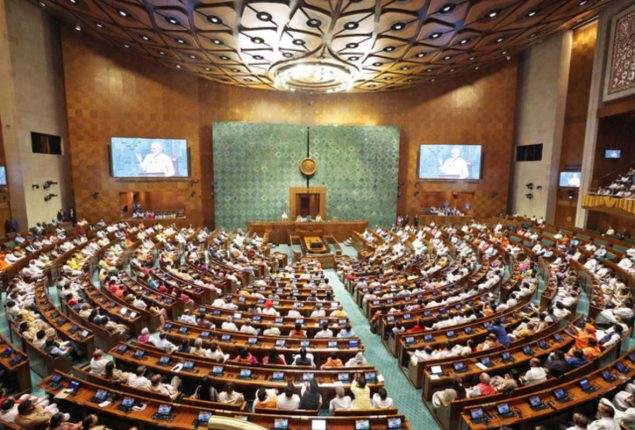
India’s Old Parliament Receives Heartfelt Tribute from Lawmakers
- Indian parliamentarians pay tribute to old parliament building
- A special week-long parliamentary session called by the government
- The new parliament building was inaugurated in May, but no legislative business conducted there until now
Indian legislators, including Prime Minister Narendra Modi, have paid their respects to the country’s former parliament building in anticipation of their move to a new facility.
This tribute occurred during the opening day of a special week-long parliamentary session called by the government.
Although Prime Minister Modi officially inaugurated the new parliament building in May, no legislative business had been conducted there until now.
On Tuesday, the session will transition to the new building following an event commemorating the historical significance of the old parliament.
This special session has drawn criticism from opposition leaders who argue that the government has not fully disclosed all the matters that might be addressed during the week.
While the government has listed eight bills for discussion during the session, the agenda may be modified or expanded in the coming days.
Opposition leaders have raised questions about the necessity of holding a special session to discuss these bills when MPs are scheduled to convene for the regular winter session of parliament later in the year.
Traditionally, Indian lawmakers gather for regular sessions three times a year: the budget session, the monsoon session, and the winter session.
On Monday, Prime Minister Modi initiated the special session by acknowledging the historic role of India’s parliament since 1947, when the nation gained independence from British colonial rule.
The government has organized several events to mark the 75th anniversary of India’s independence.
Prime Minister Modi expressed the sentimental significance of leaving the old parliament, which holds cherished memories, and emphasized that the structure would continue to inspire future generations.
“The biggest achievement of this parliament is that it has kept people’s faith in democracy alive,” he said in a speech where he also mentioned India’s successful Moon landing and hosting of the G20 summit.
Before the special session, some opposition leaders reminisced about their experiences in the old parliament while also taking aim at Prime Minister Modi’s government, accusing it of evading questions and targeting political opponents.
Prime Minister Modi had indicated that the session might be relatively brief but would involve “historic decisions.” Special parliamentary sessions are relatively uncommon in India, typically convened for specific occasions like commemorating parliamentary or national milestones, according to legislative expert Chakshu Roy.
The announcement of this session last month prompted criticism from opposition leaders who raised concerns about the government’s lack of transparency regarding the agenda.
It also fueled widespread speculation, with some observers speculating that the government might call for early elections or even consider changing the country’s name from India to Bharat, following a controversy related to a potential name change.
Others have suggested that the government might introduce a landmark bill reserving seats for women in state legislatures and parliament.
On Monday, some opposition lawmakers protested outside parliament, urging the introduction of this bill. However, the government has not officially confirmed any of these speculations.
Last week, after facing weeks of criticism from the opposition, the government released a “tentative agenda” for the session, which included four bills for debate.
Among these bills was a contentious one that sought to alter the process of appointing India’s chief election commissioner.
Opposition parties have voiced objections to this bill, describing it as “undemocratic” and claiming that it would diminish the independence of the Election Commission and its officers.
Interestingly, this particular bill was not included in the list of items provided by the government to opposition leaders during an all-party meeting on Sunday.
Read More News On
Catch all the India News, World News, Breaking News Event and Latest News Updates on The BOL News
Download The BOL News App to get the Daily News Update & Follow us on Google News.




